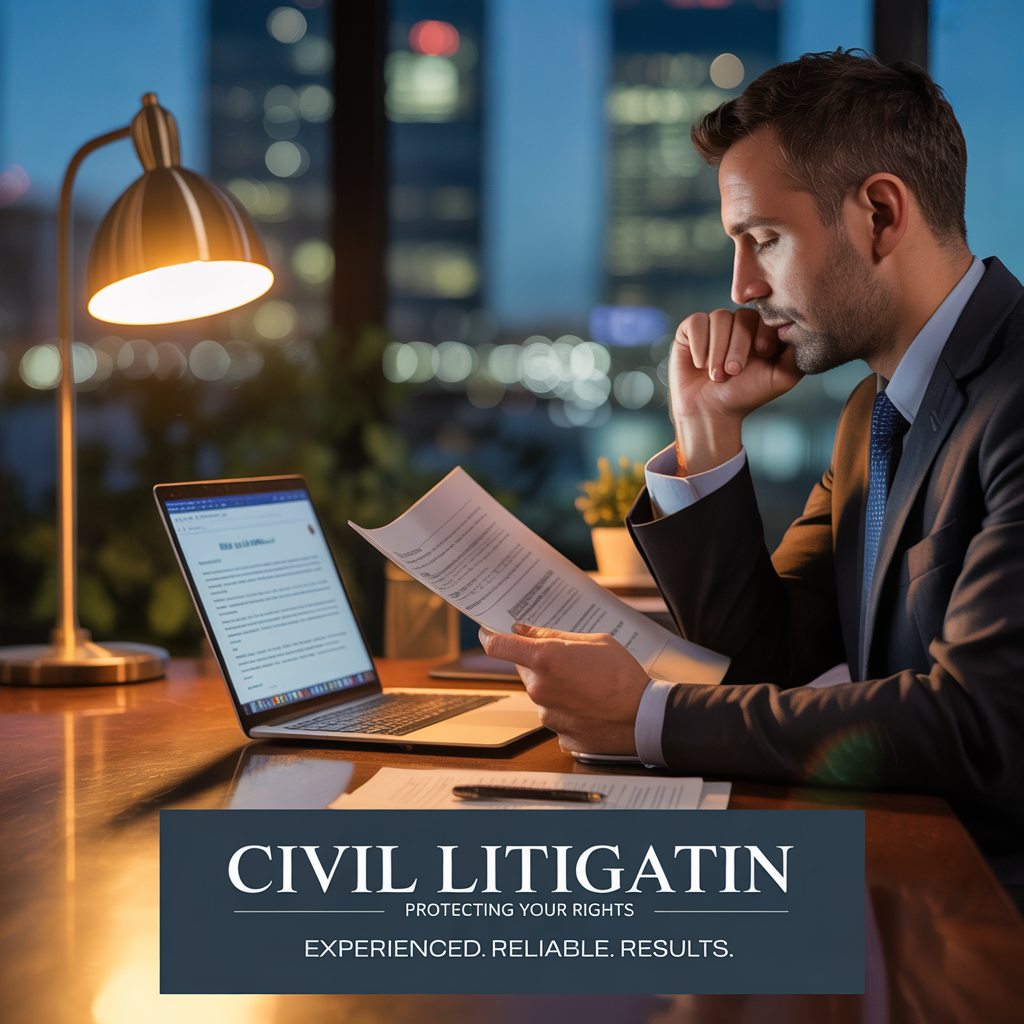When disputes arise, it often feels like the world is closing in. Whether it’s a breach of contract, property damage, or personal injury, navigating the complexities of civil law can be daunting. This is where a civil litigation attorney steps in—not just as a legal representative but as your strategic partner to help you find resolution. With their expertise and experience, they guide you through the intricate maze of legal processes that come with any civil dispute. Let’s dive into what civil litigation entails and how having an expert by your side can make all the difference in achieving a favorable outcome.
What is Civil Litigation?
Civil litigation is a legal process involving disputes between individuals or entities. Unlike criminal cases, which are prosecuted by the state, civil matters focus on resolving conflicts that can arise in various contexts.
These disputes often relate to contracts, property rights, personal injuries, or family law issues. When parties cannot find common ground through negotiation or mediation, they may turn to the court system for resolution.
The litigation process typically begins with the filing of a complaint and summons. From there, both sides engage in discovery—a phase where evidence is gathered and examined. This stage can be lengthy and complex as it involves sharing documents, taking depositions, and building arguments.
If negotiations fail to yield results, the case may proceed to trial. Here, a judge or jury will determine liability and appropriate damages based on presented evidence.
The Role of a Civil Litigation Attorney
A Civil Litigation Attorney serves as your advocate in legal disputes. They guide clients through the complexities of civil law, ensuring their rights are protected.
From the initial consultation to trial representation, these attorneys play a pivotal role. They gather evidence, draft documents, and develop strategies tailored to each case.
Communication is key. A skilled attorney keeps clients informed throughout the process, explaining legal jargon in an understandable way.
Negotiation is another vital aspect of their work. Many cases resolve before reaching court through settlement discussions led by experienced litigators.
When litigation becomes necessary, these professionals represent you vigorously in court. Their expertise can influence outcomes significantly.
Their knowledge extends beyond just courtroom tactics; they understand procedural rules and deadlines that must be met for a case to proceed smoothly.
Types of Civil Disputes
Civil disputes can arise in various contexts, often leading to complex legal battles. Understanding the types is essential for anyone seeking resolution.
Contract disputes are among the most common. These cases typically involve disagreements over terms, breaches, or enforcement of agreements between parties.
Another frequent type includes property disputes. Issues may arise from ownership claims, boundary disagreements, or landlord-tenant conflicts.
Personal injury claims also fall under civil litigation. When an individual suffers harm due to another’s negligence, legal action might be necessary to seek compensation.
Additionally, family law matters such as divorce and child custody issues represent significant areas of civil dispute. Emotions run high in these cases, making legal guidance crucial.
Employment-related disputes often occur regarding wrongful termination or discrimination claims within workplaces. Each type requires specific expertise tailored to its unique challenges.
How to Choose the Right Civil Litigation Attorney
Choosing the right civil litigation attorney is crucial for your case’s success. Start by assessing their experience in handling disputes similar to yours. Look for a lawyer who specializes in the specific area of law relevant to your situation.
Next, consider their reputation. Online reviews and testimonials can provide valuable insights into an attorney’s track record. A strong presence within legal circles often reflects competence and respect among peers.
Schedule consultations with potential candidates to gauge compatibility. Pay attention to how well they communicate and whether they take the time to understand your concerns.
Costs are another important factor. Discuss fee structures upfront so there are no surprises later on. Transparency about pricing ensures you know what you’re getting into financially.
Trust your instincts. The right attorney should make you feel confident and supported throughout the process.
Benefits of Hiring a Civil Litigation Attorney
Hiring a civil litigation attorney can be a game-changer in your legal journey. Their expertise brings clarity to complex situations, ensuring you understand your rights and options.
One major advantage is their negotiation skills. Attorneys are trained to advocate for clients effectively, often leading to settlements that save time and resources.
Additionally, having an attorney by your side means access to invaluable resources. They have networks of experts who can bolster your case with solid evidence or testimony.
Moreover, litigation processes can be stressful. An experienced attorney alleviates this burden by managing all paperwork and deadlines while you focus on other aspects of life.
They provide peace of mind. Knowing that a professional is handling the intricacies of your case allows you to feel more secure moving forward with confidence.
Case Studies: Successful Outcomes with a Civil Litigation Attorney
One notable case involved a small business owner who faced a hefty lawsuit from a competitor. The stakes were high, with potential financial ruin on the horizon. A seasoned civil litigation attorney stepped in, crafting an airtight defense by meticulously gathering evidence and expert testimonies. The result? A complete dismissal of the case.
In another instance, an individual was wrongfully terminated from their job due to discrimination. With skilled representation, they navigated complex employment laws and secured not just compensation but also reinstatement at work.
These examples illustrate how effective legal counsel can turn dire situations into positive outcomes. Each victory reflects the attorney’s dedication to their client’s cause and highlights the importance of having experienced guidance in civil disputes.
Conclusion
Civil litigation can be a complex and daunting process. Having the right civil litigation attorney by your side is crucial for navigating these waters effectively. They bring expertise that enhances your chances of successful outcomes in disputes.
Choosing the right attorney involves considering their experience, specialization, and communication style. A skilled civil litigation attorney will not only represent you but also provide valuable insights throughout the entire legal journey.
The benefits of hiring a civil litigation attorney are numerous—from expert negotiation skills to strong advocacy in court. Their knowledge of laws and procedures helps ensure that you aren’t at a disadvantage against opposing parties.
With case studies highlighting successful resolutions, it’s clear how impactful an experienced lawyer can be for individuals facing civil disputes. Whether it’s contract disagreements or personal injury claims, having professional representation makes all the difference.
If you find yourself needing assistance with any form of civil dispute, reaching out to a qualified civil litigation attorney is undoubtedly worthwhile. Your rights deserve protection and pursuing justice becomes much more manageable when backed by knowledgeable professionals.

